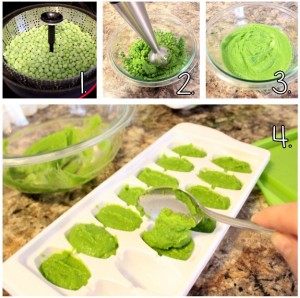Some of you, like many of my friends and family, are new parents. Here is some helpful advice regarding homemade baby food, brought to us by the Ontario Home Economics Association, and written by Emily Richards, B.Sc., PHEc.
Homemade Baby Food – Simplified
New moms and dads can navigate aisles of prepared food when baby is ready for solids. However more parents now recognize the nutritional and economic benefits of homemade baby food.
In 2014, Health Canada, Dietitians of Canada, the Canadian Pediatric Society and the Breastfeeding Committee for Canada simplified guidelines for feeding infants and young children aged 6 to 24 months.
Revised Recommendations for Introducing Foods to Baby
In brief, the new advice is to “Start Lumpy” and “Start with iron-rich solid foods at about 6 months of age − instead of previous recommendations of 4 months. Begin with well-cooked minced, mashed or shredded meat or meat alternatives (such as cooked, mashed beans or lentils, eggs) and iron-fortified infant cereals. After iron-rich foods, introduce vegetables, fruit, grains and milk products such as cheese and yogurt in a variety of textures. Delay introduction of cow’s milk until 9 to 12 months of age and limit intake to 750 mL/day. Avoid honey until at least one year of age.” More at: http://www.hc-sc.gc.ca/fn-an/nutrition/infant-nourisson/index-eng.php
Simple Tips for Making Baby Food
- Buy produce in season for best selection and price.
- Introduce one fruit or vegetable at a time to monitor reaction. Babies may only enjoy a few teaspoons initially, so prep time is minimal;
- Keep it simple − banana or hard cooked egg can be mashed with a fork;
- Steam, boil or microwave fruits and veggies until tender. Purée or mash to desired consistency by adding a bit of the nutrient-rich cooking water;
- Avoid adding salt, sweeteners and spices. Avoid rare and processed meats such as deli meats;
- No need for fancy equipment. Use a blender or sieve to puree, knives to chop and fingers to shred.
- Use clean ice cube trays or small containers to freeze purées to keep variety on hand;
- Meals prepared for the rest of the family are easily adapted for baby.
Emily Richards, PHEc, is a Guelph-based Professional Home Economist, cookbook author and member of the Ontario Home Economics Association.
Ontario Home Economics Association (OHEA), a self-regulated body of Professional Home Economists, promotes high professional standards among its members so that they may assist families and individuals to achieve and maintain a desirable quality of life.
Karla Fehr, PHEc, is a Manitoba professional home economist, guest teacher, parent and gardener. Her children are well past the baby stage, but several nieces and nephews are enjoying many new foods for the first time.







